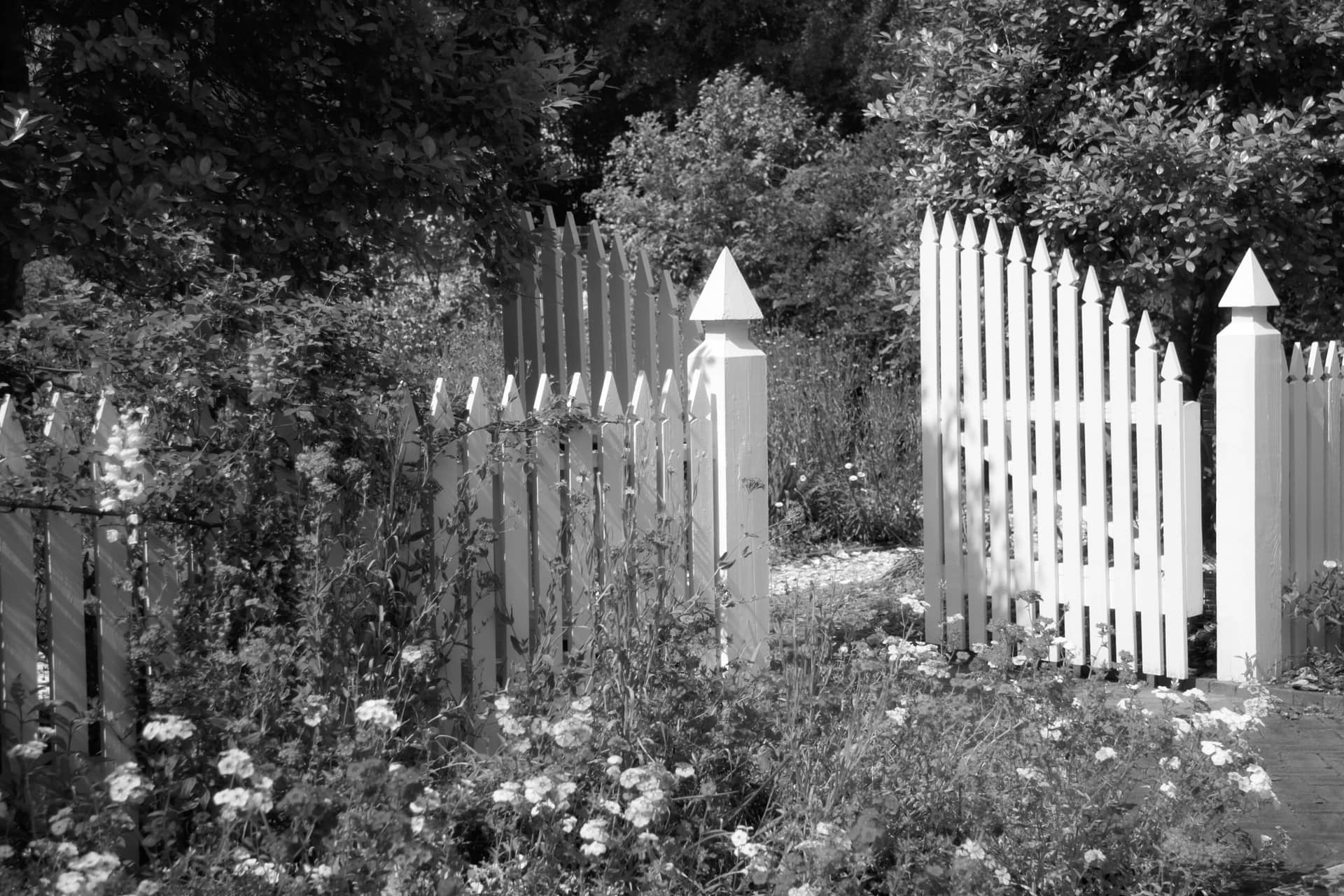October 13
The return to my grandmother’s house might be ill-advised. My husband certainly thinks so. I left him behind in London and took the train through the misty hills, the silent towns. I am secretly pleased. This, I think, is how I was supposed to make this trip: alone on a rainy day, the colours of the city peeling away as though the past twenty years were nothing more than lurid wallpaper.
I step out onto the platform like a lost jigsaw piece slotting back into place. It all looks the same. The road curling uphill, fading in the fog, the houses and trees at the top bleeding into each other. Her house, still dark as lights begin to dot the village.
October 14
The house has changed since grandfather died last year: tendrils of ivy across the eastern windows, blocking the light; a damp spot furry with fungus underneath a broken roof tile. And of course, the garden, overgrown and forbidding, all thistles and creepers and tangles and thorns. Her garden. I can’t remember grandfather ever setting foot in there.
October 15
In the afternoon, Aunt Maria comes for tea. She saw the lights on last night and was surprised to find me here. Of course, she’s not really my aunt; but she was my grandmother’s friend, and I’m glad to see her, sad to see her. She has aged badly. It’s her hip, she says, and the weather, and this damned place and those foreign people that moved in next door. Listening, I wonder if she would have aged the same way.
“Do you remember the day she vanished?” I ask Aunt Maria, and she sips her tea without looking at me.
“It’s been a while since you came,” she says. “This house has been falling apart. Ever since Ellen…well, your grandfather was never very good at upkeep.”
October 16
I search the house top to bottom, ransack through closets and drawers, under floorboards, behind books. I leave grandmother’s study for last. When I get to it, I stand in front of that door and suddenly I’m a teenager again, and as soon as I enter, I remember.
The light flooding in through the window, honey-sweet as it often is in memories, picking out the silver in her hair. She’s writing or reading or frowning over something, like she always did, so that you had to talk quite loudly to get her attention.
“Sorry,” I remember myself saying. “My friend’s doing a camping trip for her birthday. But I’ll catch the flower show next year.”
“Of course,” she says. “There’s always next year, until there isn’t.”
She has a far-away look, and I shift from one foot to the other, until she looks at me again and sighs. “Go, enjoy yourself. Be bold.”
“But not too bold,” I add, like she usually does.
October 17
I sort through the papers I found in the study. Bills and greeting cards and yellowed newspaper pages, and none of them are of any use.
The sun is mild today, faded yellow in a grey sky, and in the afternoon I step into the garden. I grab a knife and cut through the weeds. It’s good for me, this work, and I imagine she’d be pleased with me, even though I’m not good at it. I don’t know any of the plants, and I weed haphazardly, cutting myself. But I start to see, underneath, the map of the garden as I knew it, the neat lines that used to be her flowerbeds, arranged in beautiful layers. There is water whispering somewhere.
The week after she vanished, I saw a photograph. White flowers all in bloom, caught in their widest, brightest moment. Jasmine and honeysuckle and hydrangeas and, in the middle of everything, a raised flowerbed full of snowdrops.
“She’d have won this year,” Aunt Maria said, holding the picture at a distance, like a painting. “All white. How she got them all to bloom is beyond me.”
I never got to see them. When I came back from the camping trip, the flowers were gone and only the scent of honeysuckle still hung heavy in the air.
October 17, Evening
There is a place in the village where you can get the best phone signal, up the hill between the post office and the cemetery. I have three voicemails from my husband, and they say exactly what I expected them to say. It should be endearing, knowing someone so well, but instead it feels like struggling to breathe, like a hand around my throat. He says I’ve stayed too long, and there’s a train home tomorrow afternoon, and it’s urgent because there are business accounts I need to look at and contractors are starting work on the house. Of course, the accounts are his, and so is the house. Standing here, where I stood as a fourteen-year-old the day after my grandmother vanished, I see the years laid out at my feet, blurry-grey in the October drizzle. They are not what I had imagined. The silent, childless house, full of my mother-in-law’s furniture and rugs; and London, which I always hated, the buildings crowded so close, the narrow streets, and nowhere a place to breathe, to look around, to see one’s life laid out at one’s feet.
It feels to me as though sometime after my grandmother vanished, perhaps even the very next day, I’d taken a wrong turn and never looked back.
October 18
I work in the garden. I don’t see anyone. It’s a cold, colourless day, but I sweat, digging and trimming for hours, until my nails are crusted with soil.
In the center of the garden, where grandmother used to plant her flower show seeds, I pull out a tangle of thistles. Underneath, I find a single snowdrop bud, upright among the weeds and white as clouds.
October 19
There is a letter from my grand-aunt Denise, who lived in France, at the bottom of the stack of papers I took from grandmother’s study. There is a paragraph in it I read over and over again.
I can read between the lines of your letters. Ellen, I’m worried about you. I don’t think you should stay in that house a moment longer. But be careful: pack discreetly, leave when Jon’s away. Go to mother’s house. I’ll come home next month and we can sort out everything. I promise.
My skin prickles. I can barely read the writing anymore; the sun has gone down, and a chill creeps in through the cracked window frames. I fold the letter and walk out into the garden. In the heart of it I find that single snowdrop. It has bloomed overnight, despite the cold, and its open petals are not white but red as blood.
October 19, Night
Under the blankets in my old bedroom, I can’t get warm. I curl up and shiver and memories bloom unbidden in my mind. My grandfather’s face. His body, too small in the hospital bed; his hand squeezing mine. The tears in his eyes at my wedding.
The first time I saw him get really angry, and how the words stuck in my throat and I stood rooted to the spot, afraid to move.
The way my grandmother talked to him. Gentle, even-keeled. The way she winced slightly when he put his hand on her shoulder.
October 21
“Do you remember the day she vanished?” I ask Aunt Maria. She sips her tea and shifts uncomfortably in her chair. But this time, I do not relent.
“You know, I’ve always felt guilty for leaving. It was a stupid camping trip. I always thought if I’d been here, maybe…”
“Oh, it’s better that you left,” she says quickly.
“Yes?”
I hold her gaze.
“That day,” she whispers. “That day, I was walking by their garden wall, and I saw Jon in there.”
“Grandfather never went into the garden.”
“Well, he was there. Shouting and screaming and crushing her flowers, walking all over them. You know, the ones she planted for the flower show. The white ones.”
“Crushing them?”
“When I walked by, there wasn’t much left of them. You could hear the shouting a street away. Ask old man Hawthorne next door. Saw him watching through the window.”
There is a long silence. Then Aunt Maria looks up at me.
“I never thought it was anything. Someone like Jon, you know. Just a bad day, that’s all.”
October 26
I’ve been sick. No, not sick exactly. But I haven’t been outside, and I barely got out of bed, and I drew the curtains shut across my bedroom window. Even so, I could see the snowdrop. At night the redness seeped under my curtains. I didn’t sleep well.
When the sun comes up, I go into the garden, pick up a spade from the shed. I walk up to the snowdrop, red petals red stalk red leaves and the ground underneath is red and I push the spade into it and press down with my foot.
The rain starts pouring. Even before I see the white glint in the mud, I know what I will find.
October 31
She has a headstone now.
She has a headstone and a place where I can visit her and leave flowers. Where her relatives and neighbours and friends can come and sit and think about the things they saw, that they never mentioned to the police or to anyone; about the times they shut the windows so they wouldn’t hear. Or maybe they’ll come and think about what a shock it all is, and how nobody could have known, and how Jon Taylor always came to Sunday mass.
“Are you coming home now that it’s over?” my husband asks over the phone.
He couldn’t come to the funeral. I stand in the only place with phone signal and tell him I can’t come either, I can’t come home because it’s not my home and I haven’t been me in a long time. Something in my voice keeps him from fighting back, and at the end I cut the call and walk down the winding path from the cemetery to the house.
From this angle I see the house clearly. The way it rises from the hillside, between poplars like candles, looking out onto the village. Dignified and a little smug and in need of some paint and plants and love.
It’s mine now, because grandfather died last year and squeezed my hand in the hospital and I kissed his forehead and didn’t think of the times I saw him get really angry, of the noises I used to hear in that house some nights.
The house is mine now. And hers.
In November I will plant her garden full of flowers. Chrysanthemums, I think. Late-blooming. White as snow.

